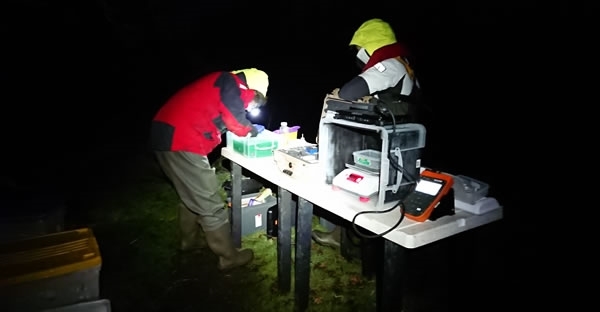
By Will Beaumont, Fisheries Scientist
Last week, in the run up to Easter, myself and several others from the Salmon & Trout Research Centre spent two nights manning an old eel trap on the Dorset Frome, 8 km up-stream of our East Stoke site.
The aim of this act of sleep deprivation was to catch 30 juvenile sea trout (smolts) on their way to sea and equip them with acoustic tags, as part of the SAMARCH project. These tags will enable us to track the smolts through Poole harbour, enabling us to investigate both survival rates and habitat usage during this critical life stage.
After passing the prerequisite Home Office training last month, and under the supervision of our Training and Competency Officer, this was my first time tagging fish.
As we tweeted last week, the weather has not been kind to us this spring and the two nights we spent tagging were no exception. With rain showers throughout the night, topping up already high river levels, trapping conditions were challenging. Not exactly the what I’d envisaged for my introduction to fish tagging.
However, despite the conditions and some initial nerves, (and with plenty of waterproofs and two thermos flasks of coffee) everything went to plan in the end. Over the two nights we caught and tagged 30 sea trout smolts, spanning the size range of river Frome trout smolts, all of whom recovered well and were released back into the river to continue their sea-ward journey.
As a bonus we also caught two sea trout smolts that had been PIT tagged previously as parr in 2016. These we released without an acoustic tag. We did, however, measure their length and weight, allowing us to fill in a little bit more detail on their complex lifecycle.
The SAMARCH Project – Improving the way we manage salmon and sea trout in our estuaries and coastal waters
We know that 95% of our salmon and sea trout die at sea after leaving our rivers as juveniles, called smolts. This compares to only 75% in the 1970’s and this is the main reason why the number of adults returning to our rivers has declined so dramatically in recent years.
However, it is not known what proportion of this mortality occurs in our estuaries and coastal waters compared to the open sea.
By using small acoustic tags implanted into salmon and sea trout smolts and the strategic deployment of receivers in the Frome and Tamar estuaries, our new EU project called SAMARCH will provide scientific evidence to answer this key question.
Each tag costs £250 and each receiver costs £1,200. We are using 480 tags and 25 receivers with the EU contributing 69% of the cost. Therefore, we are seeking contributions of £78 and £372 towards the cost a tag and receiver respectively.
Please support the project and help us reverse this alarming decline.
Donate here >